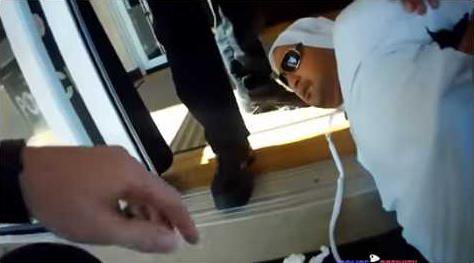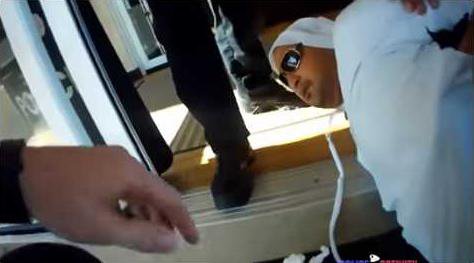A businessman from the United Arab Emirates was recently taken down by police at a hotel in Ohio after a desk clerk told her family by phone that he made her nervous. The man was wearing his country's traditional robe and head scarf.
It was like a physical version of the game "Gossip," only without any of the good humor.
News reports didn't say precisely what the hotel desk clerk told her family, but they did report that, in a call to police, one of the relatives said the man had been heard on the phone "pledging his allegiance or something to ISIS," according to The New York Times.
That never happened. The man, who the police forced to the ground and handcuffed then searched based on the telephone report, was reportedly in Ohio for treatment of a heart condition by physicians at the Cleveland Clinic.
He and the clerk who was so afraid of him had one thing in common: There's no reason to believe either one has any links to terrorism. The difference was, no one would have pinned her to the ground based on her garb or her general appearance. Who added the scary details about ISIS whether the clerk embellished her observations in a conversation with relatives or a relative added it to bolster the supposed gravity of the threat isn't clear.
What is clear is that when fear takes over, common sense and compassion often fall by the wayside. And it doesn't actually make anyone safer.
It's a mistake that comes at a time when people worldwide are naturally jittery because of recent attacks in multiple countries around the globe including murderous attacks on crowds in Bangladesh, Iraq and Turkey, where it is very likely that some of the people killed were Muslim.
Terrorism is not a simple us-versus-them problem. Who "us" is and "them" is depends on who's doing the talking. If you are going to couch it as us versus them, I think "them" is anyone with terrorist intent, regardless of religion or cultural background. And "us" is a very diverse group as well. So being watchful means watching for things beyond skin color or garb or cultural background. And it means sticking to the truth of what we see, without embellishment.
If we embrace the notion that all Muslims are bad, all others good, that all folks who dress a certain way or who we just think might be a particular kind of human, although we don't really know, should be condemned, we repeat past actions that we all know were wrong and that have brought us great pain and regret, from the lynching of our black brothers and sisters to the imprisonment of Japanese-Americans during a previous war.
It weakens us morally and it weakens our physical safety, too. Enough false reports, and an accurate report is less likely to be believed.
We've been told to be vigilant, which is very sound advice. There's nothing wrong with the government admonition that "if you see something, say something." But we should be a bit more clear about what we see and not let it be tainted by our ignorance of other cultures or a willingness to believe that those who look different than us are all the same and most likely evil.
It's not even effective: Murder and mayhem are not the domain of one category of people that can be judged by appearance.
The best hope we have of spotting something amiss is to have the watchful eyes and ears of all people of good will people from many cultures, who speak many languages. That kind of light overcomes darkness.
It was like a physical version of the game "Gossip," only without any of the good humor.
News reports didn't say precisely what the hotel desk clerk told her family, but they did report that, in a call to police, one of the relatives said the man had been heard on the phone "pledging his allegiance or something to ISIS," according to The New York Times.
That never happened. The man, who the police forced to the ground and handcuffed then searched based on the telephone report, was reportedly in Ohio for treatment of a heart condition by physicians at the Cleveland Clinic.
He and the clerk who was so afraid of him had one thing in common: There's no reason to believe either one has any links to terrorism. The difference was, no one would have pinned her to the ground based on her garb or her general appearance. Who added the scary details about ISIS whether the clerk embellished her observations in a conversation with relatives or a relative added it to bolster the supposed gravity of the threat isn't clear.
What is clear is that when fear takes over, common sense and compassion often fall by the wayside. And it doesn't actually make anyone safer.
It's a mistake that comes at a time when people worldwide are naturally jittery because of recent attacks in multiple countries around the globe including murderous attacks on crowds in Bangladesh, Iraq and Turkey, where it is very likely that some of the people killed were Muslim.
Terrorism is not a simple us-versus-them problem. Who "us" is and "them" is depends on who's doing the talking. If you are going to couch it as us versus them, I think "them" is anyone with terrorist intent, regardless of religion or cultural background. And "us" is a very diverse group as well. So being watchful means watching for things beyond skin color or garb or cultural background. And it means sticking to the truth of what we see, without embellishment.
If we embrace the notion that all Muslims are bad, all others good, that all folks who dress a certain way or who we just think might be a particular kind of human, although we don't really know, should be condemned, we repeat past actions that we all know were wrong and that have brought us great pain and regret, from the lynching of our black brothers and sisters to the imprisonment of Japanese-Americans during a previous war.
It weakens us morally and it weakens our physical safety, too. Enough false reports, and an accurate report is less likely to be believed.
We've been told to be vigilant, which is very sound advice. There's nothing wrong with the government admonition that "if you see something, say something." But we should be a bit more clear about what we see and not let it be tainted by our ignorance of other cultures or a willingness to believe that those who look different than us are all the same and most likely evil.
It's not even effective: Murder and mayhem are not the domain of one category of people that can be judged by appearance.
The best hope we have of spotting something amiss is to have the watchful eyes and ears of all people of good will people from many cultures, who speak many languages. That kind of light overcomes darkness.





